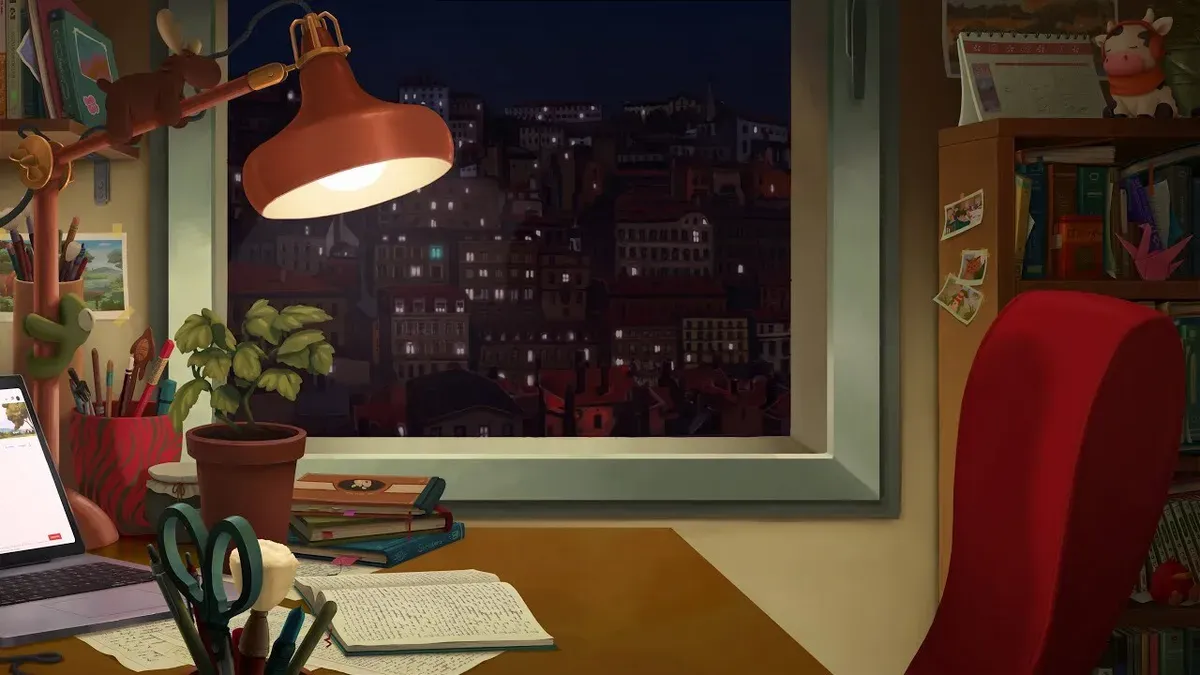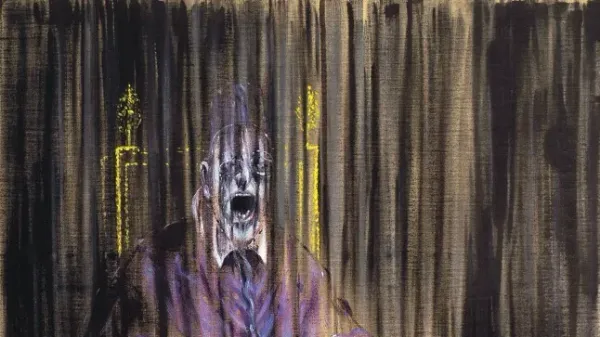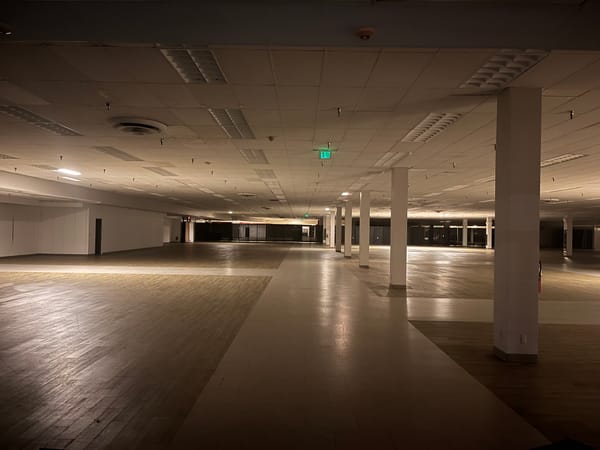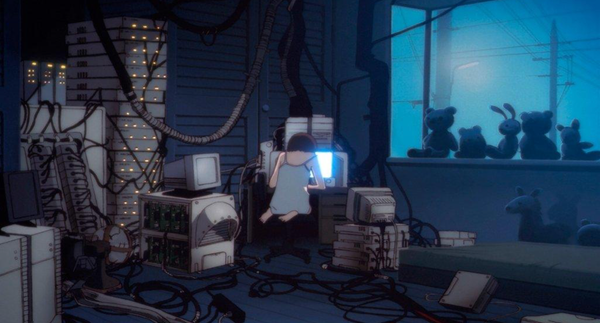Fascism, AI Brain, and Loving The Work

today i saw an image, posted by the official White House Twitter Account, of an image of a woman being deported, reprocessed by AI in the style of legendary animation house Studio Ghibli. this is, patently, one of the most evil things i’ve ever seen. it marks the absolute nadir of the cultural production surrounding Generative AI, a product whose main financial backers insist will change human civilization as we know it yet thus far has proven capable of little but creating shitposts, mass-producing fascist propaganda, and helping bored teenagers cheat on exams.
the fact that AI is being used to clone artist’s existing styles at all is a crime. but there’s something particularly atrocious about the fact it’s being used against Studio Ghibli of all institutions. talking about Ghibli’s legacy feels almost redundant: they’re legendary throughout film and animation spaces for creating lavishly detailed, hand-drawn animated films with an intense focus on the specificity of place and an underlying antifascist ethos serving as the backbone to each of their stories. forty years of painstaking labor by hundreds of virtuosic artists is now being chewed up and shat out by a lying machine built by a bunch of malignant manchildren, and that shit is being employed by our very own home-grown fascist movement to legitimize their xenophobic, white-supremacist agenda.
it needs to be said: these people hate you. the objective of the AI push is not to ‘democratize’ art (artistry has always been accessible to anyone willing to put in the effort) but to destroy it altogether. what they’re doing is the intellectual equivalent of putting sawdust in your milk. they want to feed you poison. they want to strip the substance away from everything you care about, to turn it all into homogenous, indistinguishable capital-C Content, and they’re banking on you being too fucking stupid to notice or care. in the future they imagine, everyone will have their own perfectly-enclosed media ecosystem, only showing people exactly what they want to see, and all of it will taste like ash in your mouth.
it’s important to note, however, that this has been going on for a long time. in genre spaces over the past decade or so, there’s been a significant upswing in so-called ‘ghibli inspired’ media. you might have seen gifs of the breakfast scene from howl’s moving castle posted on your social media feed, captioned with something like ‘Ghibli food looks so good 😋’. what these things illustrate is a refusal to engage with these things as holistic art, to put them in a centrifuge and take out everything aesthetically appealing (lavishly-detailed natural environments, a soft, nonthreatening aesthetic) and remove everything that doesn’t conform (recurrent themes of the horrors of fascism and imperialist war, often brutal violence). in other words, it wouldn’t be possible for these vomit-machines to create something in the ‘Studio Ghibli style’ if we hadn’t already come to some cultural consensus that the Studio Ghibli style was something purely aesthetic (aesthetics being, after all, the only thing that AI is actually capable of replicating.)
this deracinated style is capable of applying to anything. stripped of deeper content, the surface imagery of Ghibli movies can be used to espouse whatever movement you wish. no wonder, then, that right-wing movements globally have been so keen to adopt AI as one of the chief support struts of their messaging apparatus. AI demands a world in which everything has become empty, interchangeable signifiers, where no relationship exists between form and content.
if you speak to AI boosters– the people who insist it ‘learns just like humans do,’ and that ‘artists are just mad because machines can draw better’– it’s hard to walk away without a sense of profound existential dread. these are spectacular people, only capable of operating in the domain of images. Elon Musk’s repeated bloviation about how ‘the future should look like the future’ is a good example of this mindset. what matters to Musk about a film like Blade Runner is not its musings on the nature of human identity, and its (often clumsily handled) commentary on the exploitation of women, but its set design, Rick Deckard’s cool gun and cooler car, its status as Canonical Sci-Fi. when people wonder how Musk could love a series like Iain M. Banks’ The Culture universe, which, for all its faults, is an earnest attempt by an anarcho-socialist to envision a post-state, post-capitalist, post-gender future, the answer is simple: he doesn’t read them. not in any way that matters.
no wonder, then, that AI art has such a right-wing bent. beyond the obvious parallel of both being fueled by a contempt for predominantly left-wing creative labor, fascism presents itself to the average prole as a performance. nothing gets better under fascism for the average person, even for the portion of the citizenry not marked out for arbitrary state violence. what fascism actually offers is a performance of strength, the public and gratuitous punishment of those individuals or populations marked out as ‘enemy’, and often that’s enough. the fact that studies are increasingly beginning to show a link between frequent AI use and reduced critical thinking skills isn’t an accident: the technology is designed to make people intellectually lethargic and incurious, regurgitating whatever the model or Party tells them.
I don’t think that AI is going to achieve the kind of total societal penetration that the finance freaks insist it will. more likely, I see it taking the same kind of trajectory as crypto: an increasingly desperate insistence that Everyone Must Get In Line With The Wave Of The Future, followed by a collapse and an embarrassed retreat back to a relatively small industry primarily utilized by a population of devoted evangelists. but at the same time, I don’t think we’re ever getting rid of AI, either. most likely there will be some ‘floor’ of autogeneretated slop, marketed at those too ignorant to know better or too poor to afford better. our shared informational ecosystem will be increasingly polluted, and everyone will get a little dumber and a little more confused as a result.
there’s a common refrain that opposition to AI amongst creative types is purely a case of sour grapes: that, having ‘wasted our lives’ studying our specific craft, we’re now upset that someone’s made a machine to do it better. i don’t think that’s true, for the reasons i’ve outlined above. but, more than that, I think that even if AI was capable of doing the things its proponents claim, i wouldn’t have wasted the time I’ve spent becoming a writer. all art, is, to some extent, an exercise in thinking, and learning to create is learning to think in certain ways. thinking– about images, about spaces, about language, about sound– is good in and of itself, regardless of whether we can compete on volume with a machine given the prompt ‘Master Chief standing holding bolter Warhammer 40k epic cinematic photorealistic Artstation.’
when a woodworker makes a chair for their personal use, it’s very rarely because they don’t know they could get a chair much faster and cheaper at the local IKEA. when an English teacher assigns an essay, it’s not because they’re deeply curious what a bunch of undergrads have to say about Frankenstein or Dante’s Inferno. both of these cases are predicated on the idea that there’s something inherently valuable in the doing of an act. When people describe themselves as ‘AI authors’ or ‘AI artists,’ what they’re signalling is that they only assign value to the end product of a work. It’s the equivalent of saying you’ve solved an Agatha Christie novel’s mystery by skipping to the last page to figure out who the killer is.
despite their often noxious and anti-human affects, I can’t help but feel a kind of sadness for these people. they skate along the surface of life, unable to access anything not readily available for instant gratification. give these people all the money and power in the world, and they still wouldn’t be able to love a great movie, or appreciate the depth and texture of a good album. it is a point of view that precludes true communion with the world, or with others. to them, the whole world exists to flatter them, to pat their engorged egos and tell them what good smart boys they are. the tech industry at large is run by a bunch of fully-grown adult men, who strut around proudly announcing they hold ideological positions indistinguishable from that of a baby directly out of the womb.
if there’s an ultimate message to this essay, it’s to allow oneself to engage with difficult things for their own sake. make something with your own hands, even if it turns out amateurish and bad. sit with discomfort. take things seriously. treat things as worthy of analysis. and, hey, maybe watch Princess Mononoke again. the work of 40 years deserves to be something more than a filter.


